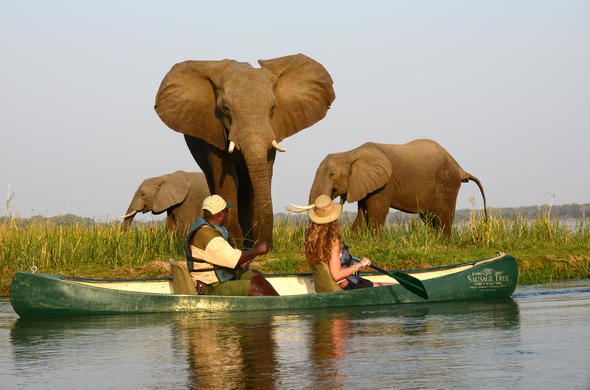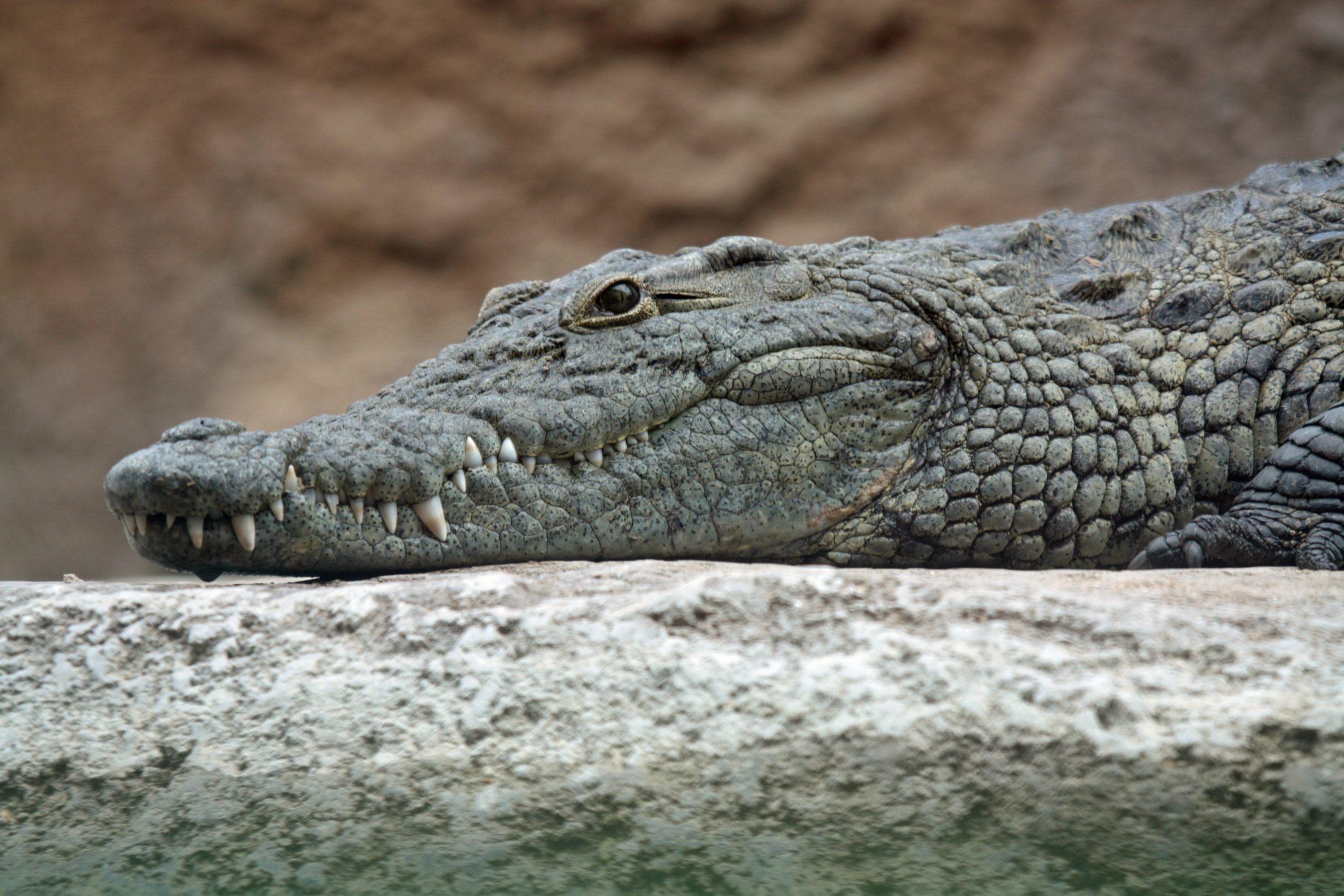BY DOUGLAS ROGERS
One writer returns to the country of his birth to discover how a ‘Wonder of the World’ is transforming tourism in troubled times.
It was 4pm in Zambezi National Park, a few miles from the majestic Victoria Falls in Zimbabwe, and the watering hole was quiet. A fireball sun dipped over the borderlands to the west. From our timber-built hide, my son Whitaker, aged 12, panned his binoculars across the landscape and saw a cloud of dust on the horizon. “There’s something coming,” he said.
Steve Taylor, our Zimbabwe-born guide, took a look. “Good spot, Whitaker,” he said. “Buffalo. Hundreds of them!” He checked his watch. “They’ll be here in 45 minutes. Anyone fancy a sundowner?”
Sure enough, exactly 45 minutes later, 300 Cape buffalo stood drinking at the pan and, like a post-work stampede for happy hour, other animals began to appear – antelope, warthog, a dozen elephants, a lone giraffe. Somewhere nearby, hyenas howled.
“Ten years ago, you wouldn’t have seen game like this here,” said Taylor, founder and owner of Askari Safari, who splits his time between the United States and a new home in Victoria Falls. “The area was in trouble, and there were few animals because of poaching and mismanagement. Now, all that is changing.”
The reason is the establishment, in 2011, of the Kavango-Zambezi Transfrontier Conservation Area (Kaza), or Five Nations Peace Park. Kaza is the joining together of 36 national parks and three World Heritage Sites on the borders of five countries – Angola, Namibia, Botswana, Zambia and Zimbabwe – making it the largest transboundary wildlife system in the world. The size of France, and home to half of Africa’s elephants, Kaza has shown how cross-border cooperation on wildlife management, anti-poaching and community conservation can transform animal populations
Tourism is making a comeback, too, and Victoria Falls – Zimbabwe’s spray- drenched colonial river town, a Wonder of the World within Kaza – is booming. Helicopters buzz the cataracts, white-water rafters and luxury river boats ply the Zambezi and people like Taylor, who left Zimbabwe in the bad old days, are buying property there or moving back permanently.
This was my first post-Covid trip to the country of my birth, from my home in the United States. Part of the reason was to attend a memorial service for my late father in eastern Zimbabwe, where I grew up, but it was also a chance to spend a week’s holiday with my extended family in the Falls, on the opposite side of the country.
I love coming “home”, but Zim is a mess. Inflation is rampant, prices are exorbitant, roads and other infrastructure are crumbling. The exception is Victoria Falls, which might as well be another country. My first glimpse of it was at the impressive airport built by the Chinese in 2015. International flights arrive from seven countries and the energy and excitement at arrivals far exceeds what you feel when landing in Harare, the capital. “We have a saying here: ‘Turn left for Victoria Falls, turn right for Zimbabwe’,” said our transfer driver as he turned left out of the airport on to a smooth, newly built road towards the regenerated town.We had booked a thatched four-bedroom Airbnb named Acacia, in a leafy suburb, and that afternoon did what every self-respecting visitor to the Falls does: have high tea at the Victoria Falls Hotel. I confess, I was braced for disappointment. Built in 1904, the grandest of southern Africa’s grandes dames offers spectacular views of the steel railway bridge across the Zambezi Gorge, but my last visit there 15 years ago had been a complete disaster. With political turmoil and hyper-inflation at their height, there was no electricity, my room was full of cobwebs and I paid my bill with a backpack full of Zimbabwean dollars.
This time around, much to my surprise, the hotel was undergoing a multi-million-dollar renovation – and it looked immaculate. We were swiftly ushered to the Stanley Terrace, fronting lush green lawns where cucumber sandwiches, scones and a dozen types of cake were being delivered in style on three-tiered silver platters.
Far from rejecting its colonial past, the hotel honours it with an entire hallway of framed photographs of British Royalty. All around us, well-heeled Americans and Europeans were enjoying their afternoon teas and quaffing their pink gins.
But it isn’t just tourists who are coming back to this trend-bucking corner of Zim. An estimated five million Zimbabweans have fled the country since 2000, and most of them continue to live abroad. Of those returning, many choose to settle in the Falls. To get a glimpse of this local scene, Stephen Taylor suggested I visit Loretta’s Coffee Caravan, just around the corner from our Airbnb.Five years ago, the cafe’s owner “TK” Musungwa was running a driving school in Stockport, England, his family having fled Zimbabwe for Manchester in the early 2000s. On a visit to Harare, he met his now wife Loretta – a barista – and on a trip to the Falls, they discovered that they couldn’t find a decent cup of coffee anywhere. TK said farewell to England and Loretta’s Coffee Caravan was born, serving a chocolate-rich blend of Zimbabwean, Rwandan and Tanzanian beans as well as fruit smoothies.
“Vic Falls feels like an island far removed from the madness of Zim,” TK told me, “a small town where people can reinvent themselves. England is an easier place [to live], but this is the home I love.”
I certainly loved Loretta’s – a bustling coffee shop with tables set under a mahogany tree, frequented not by commuters seeking their caffeine fix but by khaki-clad game guides, armed park rangers, dashing river rafters and real-estate agents cashing in on the property boom.
On our third day, we hit the rapids. The Zambezi below the Falls arguably offers the greatest white-water rafting in the world, so I booked a trip with local outfit Shockwave.Its river outings are not for the faint-hearted. First comes an hour-long trek into the boiling belly of the gorge with the unsettling knowledge that an even steeper climb (up) awaits you down river. Tackling Grade 5 rapids with names such as Jaws of Death and Washing Machine is both terrifying and exhilarating. We were lucky to have as our guide Pilani Moyo, the owner of Shockwave and the first black Zimbabwean to own a rafting business on the Zambezi. He spends the off-season guiding on the greatest rivers in the world and has a home in Colorado, in the United States.
More sedate by far was the four-hour dinner cruise we took on the lush upper reaches of the river, a mile or two upstream from the Falls. I recall taking a “booze cruise” here years ago – on a rusty junk of a vessel filled with rowdy passengers drinking warm beer. This was very different. Our boat, Pure Africa’s Zambezi Explorer, was a sumptuous three-deck vessel with designer sofas, hand-woven Ndebele-patterned chairs and a staff of mixologists, waiters and chefs in addition to the boat captain.Dinner was served at sunset as we cruised past long-tusked elephants grazing on the riverbanks, with hippos snorting in the shallows and a fiery sun setting over towering palm trees upriver. To our immediate right was Zambia, with Botswana, Namibia and Angola beyond. My all-American children were wide-eyed with wonder, and I thought of all the fellow Zimbabweans I had met who had opted to return home. As I write this, I am looking at properties online and thinking seriously about following them. Something must come up.
Essentials
Douglas Rogers was a guest of Askari Safari (askarisafari.com), which offers a five-night Victoria Falls tour taking in Zambezi National Park from £4,000pp. It includes a guided visit to the Falls, three adrenaline activities, a river cruise plus all breakfasts and dinners, but not flights. In 2025, he and Askari’s owner, Steve Taylor, will lead Storyteller 2025 – a two-week literary safari with talks by game guides, writers and artists.
Five reasons to visit Victoria Falls
- Wildlife wonders
The Falls themselves are wild – but the resurgent animal population is another reason to visit. The region comprises two national parks and is on the edge of the great Hwange game reserve. For the best viewing close to town, take a guided or self-drive trip to Chamabonda Vlei, a narrow plain dotted with watering holes within Zambezi National Park. While you are in town, book a visit to the Victoria Falls Wildlife Trust (vicfallswildlifetrust.org), a non-profit organisation that rescues animals wounded by poachers.
- Luxurious lodgings
The refurbished Victoria Falls Hotel offers the ultimate in Edwardian era refinement (victoriafallshotel.com; doubles from £420 per night). Ilala, with its gardens and thatched roofs, has a timeless, classic safari lodge feel (ilalalodge.com; doubles from £380). Newly opened Drift Inn is a budget nine-room B&B offering great breakfasts, artisanal coffee, a swimming pool and a yoga, massage and reflexology studio (driftinnvicfalls.com; doubles from £75).
- Glorious food
Chef, restaurateur and cookbook author Sarah Lilford serves up Zimbabwe’s most exciting culinary offering at Dusty Road (dustyroad.africa). The daughter of white farmers who lost their land in the early 2000s, she set up her restaurant in working-class Chinotimba township offering authentic Zim dishes – beef stew, chicken in peanut butter, grilled bream – cooked on wood fires. Enjoy them on the veranda or under trees in the backyard. Don’t miss the dried mopani worm snack or the vodka cocktail made with baobab powder. In town, the Three Monkeys (3monkeyszw.com) serves a great tomahawk steak. Next morning, order a flat white at Loretta’s Coffee and Smoothie Caravan on Reynard Road.
4. Thrills and spills
Victoria Falls is Africa’s adventure sports capital. Shockwave (shockwavevictoriafalls.com) offers exhilarating white-water rafting trips, while Wild Horizons (wildhorizons.co.za) operates the heart-in-mouth gorge swing and zip-line right in front of its uber-stylish Lookout Café (thelookoutcafe.com). Shearwater (shearwaterbungee.com) pioneered bungee jumping off the Vic Falls bridge. For more leisurely river adventures, Pure Africa (pure.africa/experiences) offers elegant sunrise, sunset and dinner cruises on the Zambezi in a fleet of luxury vessels.
- Art and history
Renowned artist and conservationist Larry Norton has a gallery at the Victoria Falls Hotel (larrynorton.co.za), showcasing his giant, hyper-realistic wildlife paintings. The hotel’s open-air Stone Dynamics Gallery (stonedynamicsgallery.com) displays and sells the work of some of Zimbabwe’s leading sculptors, including Dominic Benhura. Meanwhile, historian Chris Worden from Footsteps of Livingstone (footstepsoflivingstone.com) gives a mesmerising one-hour talk on the life of David Livingstone that could almost be a one-man play in London’s West End. The Telegraph


 Slider3 years ago
Slider3 years ago
 National4 years ago
National4 years ago
 Opinion3 years ago
Opinion3 years ago
 Tourism and Environment4 years ago
Tourism and Environment4 years ago
 National2 years ago
National2 years ago
 National3 years ago
National3 years ago
 National2 years ago
National2 years ago
 National4 years ago
National4 years ago


